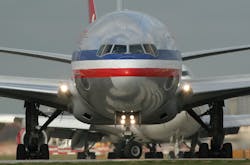American Airlines Wants Unions To Give Up $990 Million
April 24-- Executives and lawyers for AMR Corp., the parent of American Airlines, said Monday its three unions must give up $990 million a year in wages and benefits for the airline to emerge from bankruptcy as a competitive network carrier.
Speaking at the beginning of a trial in U.S. Bankruptcy Court in New York on AMR's motion to reject its collective bargaining agreements with its unionized mechanics, pilots and flight attendants, AMR's lawyers and witnesses said the company has tried without success to negotiate restructured labor agreements since Feb. 1.
The trial on AMR's Section 1113 motion is expected to last at least two weeks, AMR and court officials said.
The complexity of the case was underscored over the weekend when the Transport Workers Union, representing 26,000 American Airlines mechanics, filed a motion to exclude the committee of unsecured creditors from the trial on AMR's motion to reject the collective bargaining agreements.
In court documents, lawyers for the TWU said union representatives with seats on the nine-member committee of unsecured creditors -- the TWU, the Allied Pilots Association and the Association of Professional Flight Attendants -- had been excluded from committee deliberations.
Besides union representatives, the committee of unsecured creditors includes representatives of banks and suppliers who are expected to have competing interests to those of the unions, officials said.
The non-union members of the committee are the Pension Benefit Guaranty Corp., Boeing Capital Corp., Hewlett-Packard Enterprise Services LLC, Manufacturers and Traders Trust Co., The Bank of New York Mellon and Wilmington Trust Co.
"The committee's role ... is to represent the interests of all unsecured creditors (not just the Wall Street 1 percent and not just a subset of the committee members' constituencies), and to maximize values and minimize execution risks for all unsecured creditors," lawyers for TWU said in its motion to exclude.
"On information and belief the committee has recused the TWU from discussions not only about TWU issues but rather with regard to discussions with committee professionals around possible plan of reorganization structure, funding, consolidation and even benefit of aggressively attacking labor during the Section 1113 trial and then reaping a better return for certain other unsecured creditors, beyond that which is "necessary" in order to successfully reorganize."
In its objection to the TWU's motion to exclude, lawyers for the committee of unsecured creditors said when the committee's Labor Subcommittee was formed on Jan. 12, committee members determined it was not appropriate for union representatives to serve on the subcommittee as it was formed to deal specifically with Section 1113 issues.
"Common sense allows no other result, and neither do the committee's bylaws, which were approved unanimously by all the members, including the TWU, on December 22," lawyers for the committee said in court filings. "The mandatory recusal of the labor organization members from the Labor Subcommittee has been no secret, and in fact was disclosed to the court on March 22."
The committee's lawyers said it is not disputed that TWU's interests are potentially in conflict with those of the committee and its constituents with regard to the Section 1113 litigation.
"The TWU represents organized labor and is not, itself, a creditor in these proceedings," lawyers for the committee said. "Therefore, it is no surprise that the TWU's labor-related interests do not perfectly align with the interests of general, unsecured creditors as a class, especially in the context of Section 1113 proceedings where abrogation (of) the TWU's collective bargaining agreement would not result in the accrual of an unsecured claim for breach of contract.
"Under these circumstances, the TWU's claim that it was improperly excluded from the Labor Subcommittee deliberations is entirely without merit."
In a related matter, AMR CEO Thomas Horton said Monday in an email to employees that US Airways' overtures to the TWU, APA and APFA last week will not affect AMR's bankruptcy restructuring process.
"As you know, US Airways recently revealed its non-biding arrangements with our unions, which is part of an attempt to force a merger with American," Horton said. "While these tactics are not surprising ... nothing changes as a result of these announcements and we will proceed on our path toward a successful restructuring of American. Today, we began the Section 1113 process and US Airways' actions are in no way binding on our company or our unions.
"First and foremost, everyone should understand that what's best for our company, our people and our financial stakeholders will be determined by the facts in a disciplined manner and process. And this includes whether American will choose to pursue any combination down the road. This is the charge of the board of directors and the leadership team to be done in close collaboration with the creditors committee."
On Friday, US Airways CEO Douglas Parker and representatives of the TWU, APA and APFA said the unions and the company had signed agreements that would govern what collective bargaining contracts would look like in a merger between American and US Airways.
Union representatives said the terms of the agreements are superior to those being proposed by American in its bankruptcy restructuring.
The bankruptcy court has granted AMR the exclusive right to develop a bankruptcy restructuring plan until at least Sept. 28, court documents show.
Copyright 2012 - Tulsa World, Okla.
